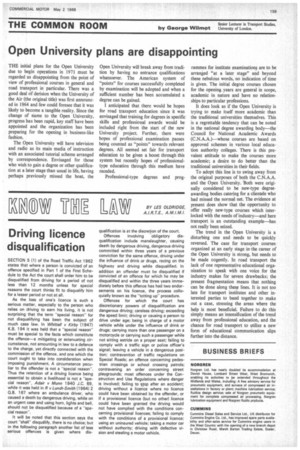MEM
Page 161

If you've noticed an error in this article please click here to report it so we can fix it.
BY LES OLDRIDGE A.I.R.T.E., A.M.I.M.I.
Driving licence disqualification
SECTION 5 (1) of the Road Traffic Act 1962 states that where a person is convicted of an offence specified in Part 1 of the First Schedule to the Act the court shall order him to be disqualified from driving for a period of not less than 12 months unless for special reasons the court thinks fit to disqualify him for a lesser period or not at all.
As the loss of one's licence is such a serious matter, especially to the person who relies on driving to earn his living, it is not surprising that the term ''special reason" for not disqualifying has been the subject of much case law. In Whittall v Kirby (1947) K.B. 194 it Was held that a "special reason" must be special to the facts which constitute the offence--a mitigating or extenuating circumstance, not amounting in law to a defence to the charge, yet directly connected with the commission of the offence, and one which the court ought to take into consideration when imposing punishment, A circumstance peculiar to the offender is not a "special reason". Thus the retention of a driving licence being essential to obtain a livelihood is not a "special reason", Adair v Munn 1940 J.C. 69, while it was held in R v Lundt-Smith (1964) 2 0.9. 167 where an ambulance driver, who caused a death by dangerous driving, while on an urgent case and using horn, lights and bell, should not be disqualified because of a "special reason".
It will be noted that this section says the court "shall" disqualify, there is no choice; but in the following paragraph another list of less serious offences is given where dis qualification is at the discretion of the court.
Offences involving obligatory disqualification include manslaughter, causing death by dangerous driving, dangerous driving committed within three years of a previous conviction for the same offence, driving under the influence of drink or drugs, racing on the highway and driving while disqualified. In addition an offender must be disqualified if convicted of an offence for which he may be disqualified and within the three years immediately before this offence has had two endorsements on his licence, the process colloquially known as the "totting up" procedure.
Offences for which the court has discretionary powers of disqualification are dangerous driving; careless driving; exceeding the speed limit; driving or causing a person to drive under age; being in charge of a motor vehicle while under the influence of drink or drugs; carrying more than one passenger on a motorcycle or carrying such a passenger while not sitting astride on a proper seat; failing to comply with a traffic sign or police officer's signal; leaving a vehicle in a dangerous position; contravention of traffic regulations on Special Roads; an offence concerning pedestrian crossings or school crossing patrols; contravening an order concerning street playgrounds; most offences under the Construction and Use Regulations where danger is involved; failing to stop after an accident; driving without a licence where no licence could have been obtained by the offender, or if a provisional licence (but no other) licence could have been granted the driving would not have complied with the conditions concerning provisional licences; failing to comply with the conditions of a provisional licence; using an uninsured vehicle; taking a motor car without authority; driving with defective vision and stealing a motor vehicle,




















































































































































































































